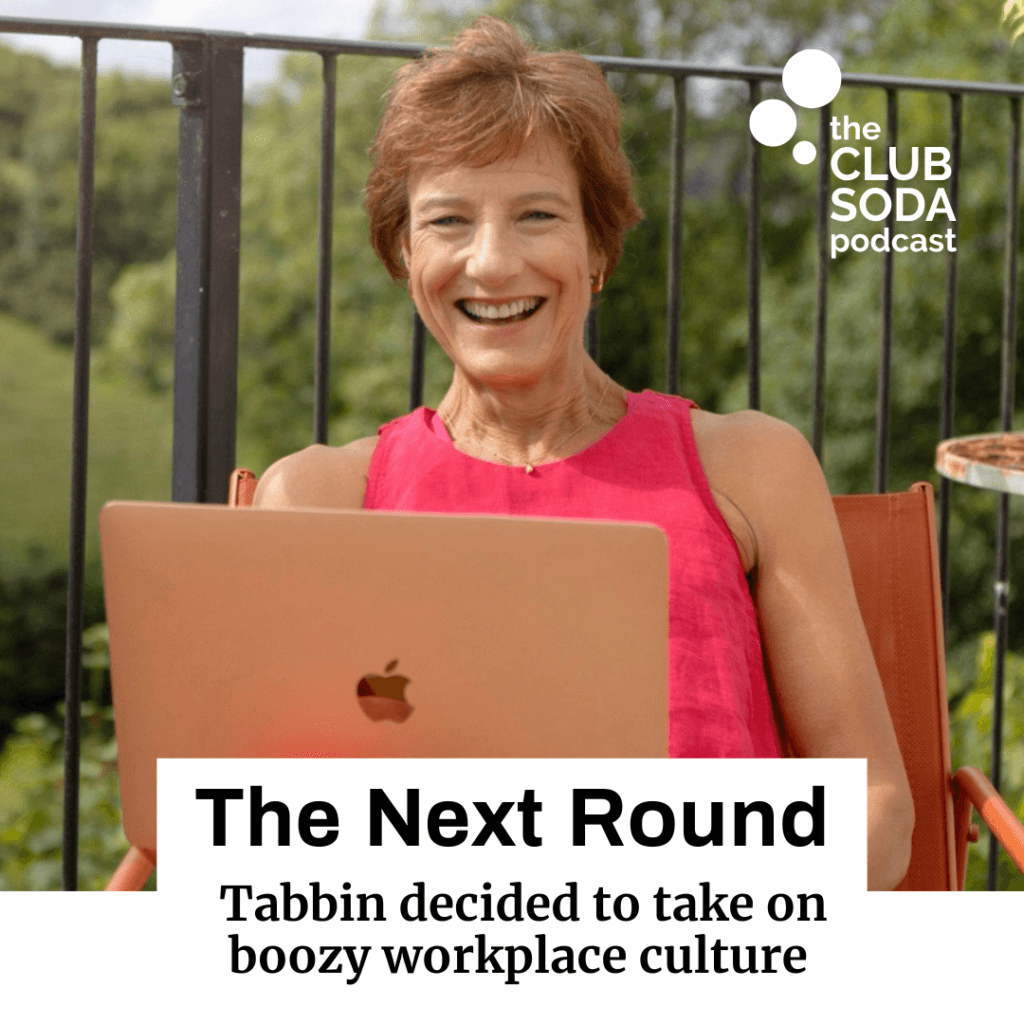This website uses cookies to improve your experience. We'll assume you're ok with this, but you can opt-out if you wish. Read More
The Next Round: What happens after you change your drinking?

Tabbin is on a mission to shake up booze-soaked workplace culture -but her own journey with alcohol was anything but smooth. After going alcohol-free for years, a cancer diagnosis sent her back to the bottle, even though drinking may have played a role in her illness.
Like so many, her drinking started at work – where long lunches and late nights weren’t just accepted but expected. Now, she’s challenging the norms that make alcohol a workplace staple, so others don’t fall into the same trap.
Welcome to The Next Round, where we dive into why we started drinking, how that history shapes our future, and what an alcohol-free life can really look like. From personal challenges to changing the world (or at least your office happy hour), there’s more on the other side than you ever imagined.
Meet Tabbin Almond -an ex-advertising pro who knows firsthand how the industry’s macho, drink-fuelled culture can spiral out of control. She yo-yoed between sobriety and drinking for years, but now she’s free and fighting to create healthier, more inclusive workplaces. Let’s get stuck in!
She believes that drinking should not be an expectation in corporate environments, nor should it be a measure of professional success or sociability.
For years, she worked in industries where drinking was not only normalised but encouraged. Client entertainment meant keeping up with drinking expectations, and refusing a drink could be seen as a lack of team spirit.
She challenges workplaces to rethink corporate gifting, expense policies, and the psychological safety of employees who may struggle with alcohol. She argues that alcohol should not be the default, nor should abstaining from it come with stigma.
Tabbin’s personal relationship with alcohol started in university but took a firm hold in the workplace. She loved the excitement of her advertising job, where long boozy lunches were standard practice. Eventually, she realised her drinking patterns were different from those around her.
Her attempts to quit drinking in the early 2000s were met with mixed results. She tried Alcoholics Anonymous but never felt like she fit in.
She later attended a hypnotherapy session that kept her alcohol-free for seven years. However, it did not address the root causes of her drinking.
After seven years alcohol-free, a major life crisis led her to drink again. Facing a serious breast cancer diagnosis, she turned to alcohol in a moment of fear.
This relapse made her realise that she hadn’t fully rewired her thinking around alcohol. Drinking in secret, when everyone thought she was sober, felt terrifying. She knew she needed a different approach. That’s when she discovered Annie Grace’s online course, which helped her shift her mindset from deprivation to liberation.
Tabbin is now six and a half years alcohol-free and actively works with businesses to shift workplace drinking cultures. She advocates for inclusive social events, better alcohol-free options, and an end to the glorification of heavy drinking.
She encourages companies to listen to their employees and ensure that alcohol-free options are both available and normalized.
For Tabbin, sobriety is not about missing out-it’s about gaining a richer, more fulfilling life. Her work is shifting the way businesses think about alcohol, ensuring that everyone has the option to fully participate, without pressure to drink.
This website uses cookies to improve your experience. We'll assume you're ok with this, but you can opt-out if you wish. Read More
| Name | Domain | Purpose | Expiry | Type |
|---|---|---|---|---|
| wpl_user_preference | joinclubsoda.com | WP GDPR Cookie Consent Preferences. | 1 year | HTTP |
| PHPSESSID | www.tickettailor.com | PHP generic session cookie. | 55 years | HTTP |
| AWSALB | www.tickettailor.com | Amazon Web Services Load Balancer cookie. | 7 days | HTTP |
| YSC | youtube.com | YouTube session cookie. | 55 years | HTTP |
| Name | Domain | Purpose | Expiry | Type |
|---|---|---|---|---|
| VISITOR_INFO1_LIVE | youtube.com | YouTube cookie. | 6 months | HTTP |
| Name | Domain | Purpose | Expiry | Type |
|---|---|---|---|---|
| _ga | joinclubsoda.com | Google Universal Analytics long-time unique user tracking identifier. | 2 years | HTTP |
| sbjs_migrations | joinclubsoda.com | Sourcebuster tracking cookie | 55 years | HTTP |
| sbjs_current_add | joinclubsoda.com | Sourcebuster tracking cookie | 55 years | HTTP |
| sbjs_first_add | joinclubsoda.com | Sourcebuster tracking cookie | 55 years | HTTP |
| sbjs_current | joinclubsoda.com | Sourcebuster tracking cookie | 55 years | HTTP |
| sbjs_first | joinclubsoda.com | Sourcebuster tracking cookie | 55 years | HTTP |
| sbjs_udata | joinclubsoda.com | Sourcebuster tracking cookie | 55 years | HTTP |
| sbjs_session | joinclubsoda.com | SourceBuster Tracking session | Session | HTTP |
| Name | Domain | Purpose | Expiry | Type |
|---|---|---|---|---|
| mailchimp_landing_site | joinclubsoda.com | Mailchimp functional cookie | 28 days | HTTP |
| __cf_bm | tickettailor.com | Generic CloudFlare functional cookie. | Session | HTTP |
| NID | google.com | Google unique id for preferences. | 6 months | HTTP |
| Name | Domain | Purpose | Expiry | Type |
|---|---|---|---|---|
| _ga_10XZMT03ZM | joinclubsoda.com | --- | 2 years | --- |
| AWSALBCORS | www.tickettailor.com | --- | 7 days | --- |
| cf_clearance | tickettailor.com | --- | 1 year | --- |
| VISITOR_PRIVACY_METADATA | youtube.com | --- | 6 months | --- |
Join Club Soda for 10% off your first order of drinks for UK delivery. Plus get our latest news and special offers for members to choose better drinks, change your drinking and connect with others.
If you get an error message with this form, you can also sign up at eepurl.com/dl5hPn